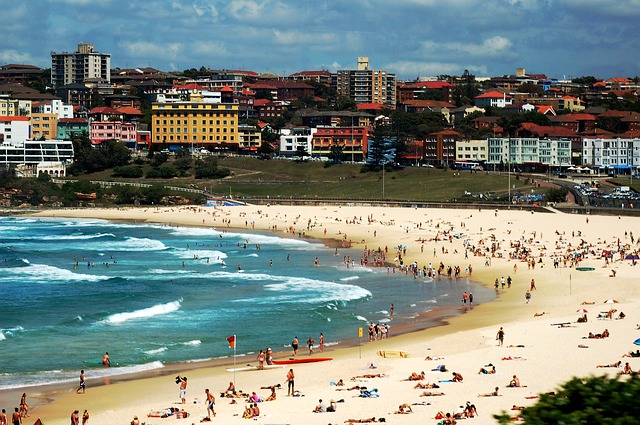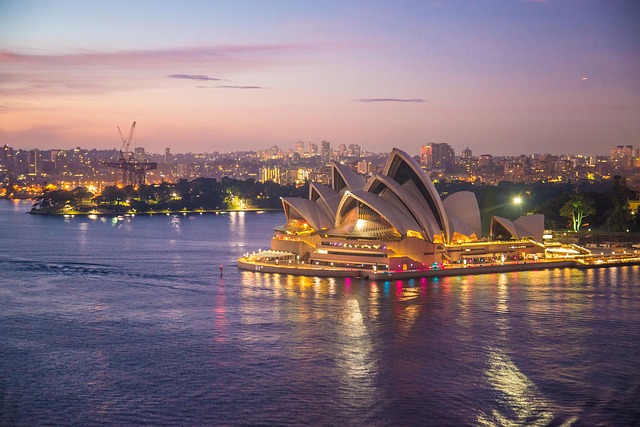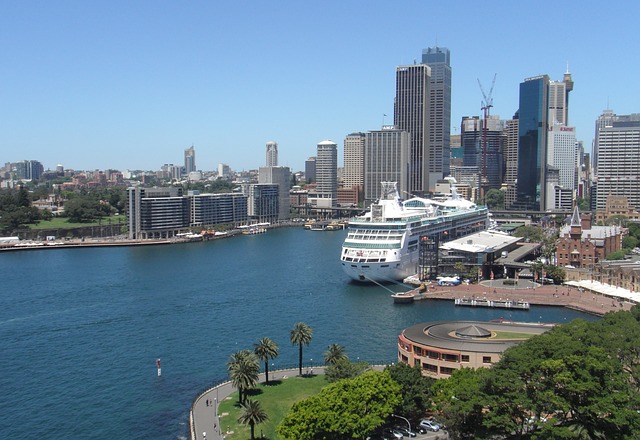It’s a long way Down Under, but moving to Australia is the ultimate dream for many British expats: sun, beaches, acres of space and friendly faces.
Would you like to start a new life in Oz?
Read on for our complete expat’s guide to Australia.

A Guide to Moving to Australia from the UK
Moving to Australia Guide
Jump to your preferred section below.
Contents
Why Move to Australia?
Australia has a unique relationship with the UK. It is one of the most popular countries in the world for British expats to settle.
The top three cities for British expats are all in Australia: Sydney, Melbourne and Perth.
We share many close ties. And many great sporting rivalries!
With a high ‘Quality of Life’ score (second in the world according to the UN), over 21,000 miles of coastline, stunning landscapes and an ideal environment for raising a family, Australia is seen as a country that shares many British values — but on a sprawling and spectacular scale.

Moving to Australia from the UK: Read on for our complete guide.
Older British expats move to Australia for the slower pace of life, the huge increase in space (larger housing) and — of course — the considerable good weather.
Australia also attracts a huge number of British students, particularly those on gap years: either travelling or getting work experience on sunnier shores.
Many British families have successfully relocated to Australia; inspired by the good healthcare, the strong education system and a friendly outdoors way-of-life that feels a million miles from the ‘packed-like-sardines’ UK.
Australia Visa Requirements for Brits
Australia is easy to visit as a tourist, but a difficult place to settle for expats.
For British visitors, there is the eVisitor scheme. This is available to all EU nationals and offers 90 days per stay over the course of 12 months.
For permanent relocation to Australia, things get a little tricky. The immigration policy in Australia is notoriously strict and works on a points basis.
Here are the most common immigration visas:
Skilled: Independent Visa — This visa is for skilled workers under 50 who are in high demand but not sponsored by an Australian state or family member.
What is a skilled worker? It is anybody working in an industry of high demand as defined by the Australian government. You can see a full list of eligible occupations here.
Skilled: Nominated Visa — This is similar to the requirements of the independent visa, except you will have been nominated by an Australian state or territory government agency.
A state or territory may open up nominations in certain fields where it has shortages in its local economy. The downside to this visa is that, as per the nomination, you must live in the nominating state/territory for the first two years of your residency.
The 457 Visa — The 457 Visa program allows you to work temporarily in Australia for up to four years by obtaining a sponsor (employer) in Australia.
While the visa does not guarantee permanent residence, it does allow you to bring your family to Australia. You can come and go as you please. To qualify, your occupation must be on the Australian government’s Consolidated Sponsored Occupation List (CSOL).
This list is considerably larger than the Skilled Occupation List (SOL).
These three options make up the bulk of long-term visas pursued by British expats.
There are many others, including:
Here is a full list of Australian visa options.
The Australian government has set up a useful Visa Wizard which walks you through the immigration process and provides advice on which visa you may be eligible for.
Way of Life in Australia
The Aussie way of life is a healthy balance between competitive spirit, family values and keeping your ‘mates’ close.
Australians love the great outdoors, which should come as no surprise when they have such breathtaking natural landscapes on their doorstep. The stereotype of barbie-loving, beer-swigging extroverts is fairly close to the mark!
Some Brits may find the friendly and open culture a slight shock to the system. Aussies are much more willing to engage a complete stranger in conversation. There’s less sitting in mutually agreeable silence, ala the London tube.
To be direct is considered a virtue.
Above all, Australia is an egalitarian society. Two qualities that run deep in the Aussie way of life are politeness and fairness.
Adopt these and you will be fine.
Historically, Brits and Aussies have learnt to appreciate each other’s virtues. Even if history dictates an intense competitive rivalry between the two nations.
Cost of Living in Australia
Australia is not cheap.
As this useful Cost of Living calculator shows, you can expect to pay more for rent and consumer goods in Australia.
Cost of Living Index (Australia vs. UK) as of July 2016:
- Consumer Prices in Australia are 8.80% higher than in the United Kingdom
- Consumer Prices (Including Rent) in Australia are 14.16% higher than in the United Kingdom
- Rent Prices in Australia are 26.83% higher than in the United Kingdom
- Restaurant Prices in Australia are 7.42% lower than in the United Kingdom
- Groceries Prices in Australia are 26.74% higher than in the United Kingdom
- Local Purchasing Power in Australia is 24.52% higher than in the United Kingdom
Source: Numbeo
The high Cost of Living probably won’t concern you if you’re employed in Australia — as you will benefit from the strong wages.
But it will have an impact if you are relying on retirement funds held in GBP, or income derived in the UK.
Popular Areas for Brits
Sydney
Wrapped around the world’s largest natural harbour is beautiful Sydney, home to the 2000 Olympics and one of the Asia-Pacific’s leading hubs of finance and commerce.
Sydney is a vibrant city with a strong jobs economy. It just happens to be surrounded by some of the most picturesque landscapes of any major city in the world.
This is a city for everybody. A short de-tour and you can be trekking around the Blue Mountains, or relaxing on Bondi beach. The city itself is a bustling metropolis.
Duck around Sydney’s skyscrapers and you’ll find a healthy mix of culture, sport, history and music.
The city hosts a number of major festivals and it pulls in tourists from every corner of the globe: including Brits.
Many of whom love it so much they end up staying as expats.
Melbourne
Melbourne lives for its sport, fashion and festivals. This is one of Australia’s most multi-cultural cities. Over 50% of the city’s residents were born overseas, whilst 30% speak a second language.
The diversity of residents is reflected in the diversity of architecture. Many of the streets have a European cobbled-together feel, with historical buildings standing proud above the many parks and gardens.
Melbourne draws expats from all over Europe, not just Britain. It is a relatively young city — a great place to work — backed by a strong jobs economy but a high cost of living.
Perth
Brits represent over 10% of the Perth population, making this one of the most ‘British’ cities of Australia. The city has a strong presence in the mining industry. A number of expats are from the mining sector and have been relocated here; often taking their families with them. Agriculture also plays a big role in the local economy.
The main downside to living in Perth is its location.
Perth is the only major city in Western Australia. It is detached from the major Sydney and Melbourne hubs; surrounded by vast swathes of coastline to the west, and the great Outback to the east.
Despite this, Perth remains a young and bustling city. It is as popular as ever with UK expats, and yet geographically isolated on a scale that few Brits could ever comprehend.
Adelaide
The southern city of Adelaide is a curious choice for British expats.
Here is a city unlike the major hubs of Melbourne and Sydney. It doesn’t feel as ‘current’ or metropolitan as other state capitals, but it still draws a healthy mix of expats: particularly those seeking a quieter pace of life with more space and larger housing.
Adelaide is strong in the defence and mining industries.
Its economy is generally weaker than other major Aussie cities, but it compensates with a much lower cost of living.
British Communities in Australia
The web throws up plenty of communities where you can meet fellow British expats in Australia — not that they are usually too hard to find!
Here are some communities and blogs where you can start networking with other Brits down under:
- Brit Expats (Australia sub-forum)
- Poms In Oz
- Australia Forum
- Britz in Oz
- Londoner In Sydney
- Lucy’s Life Lessons
- Pommie Travels
- The Only Way Is Melbourne
- The New Australian
Australia Essentials
Jobs Economy

How is the jobs economy for expats in Australia?
An expat’s biggest challenge with the Australian jobs economy is getting the necessary sponsorship to be eligible for a visa in the first place.
To acquire an employer-sponsored visa, the sponsoring company will need to prove that no local candidate is qualified to take on the responsibilities required for the position. This is on top of the points scheme that you will also have to pass.
Australia’s economy is stable with competitive industries where expats can pursue just about any career path they so desire — but only if they can secure the necessary visa.
Some of the top areas of opportunity, where skilled workers are badly needed, include mining, construction and agriculture.
Unlike some countries where a culture of insidious workaholism is the norm, Australians appreciate a good work-life balance. They like to clock off on time and hit the surf or enjoy a drink with their mates.
Expats will find that hard work is valued, but so are the core Aussie values of fun, family and friends.
Healthcare
Australia has one of the most efficient and widely admired healthcare systems in the world.
It is a mix of private and state healthcare combined in to universal medical cover known as Medicare.
All taxpayers contribute a minimum of 1.5% of their income to Medicare (or 2.5% for higher earners). The government subsidises the remaining shortfall in funding the service. Typical cover will include 100% of in-patient care charges, and around 75% of primary care charges (seeing your GP).
Most people fund the remaining 25% of primary care charges by taking out private health insurance as a “top up”.
The medical insurance market is competitive in Australia, leading to good deals for the customer. The Australian state also subsidises premiums for private health insurance cover. Standard reimbursement is 30% (35% for ages 65-69, 40% for over 70s).
If you need medicine, it is paid for on a co-pay basis with the Australian state.
The individual will foot a charge of around AUD$35 per prescription and the state will pay the rest. There are further reductions for those on low incomes or welfare benefits.
Note: Medicare does not cover dentistry, optometry or ambulance transport. Expats will need to cover these with private insurance.
The standard of general healthcare in Australia is exceptional. Very few expats miss the NHS after moving to Australia!
The country has a higher life expectancy than Britain (82.8 vs 81.2), lower infant mortality (3 per 1000 vs 4 per 1000) and a very good record when it comes to avoiding preventable deaths in care.
Note for tourists:
British residents are automatically covered by Medicare for the duration of any approved visit to Australia. This cover is provided through an exchange scheme similar to the EHIC (European Health Insurance card) whereby Brits are covered in Australia and Australians are covered in the UK.
The cover protects against any injury or ill-health deemed to require medical treatment.
Bringing Kids to Australia
Australia is one country where you don’t have to worry: “Will the kids be okay?”
The education system is outstanding, your home is likely to be considerably larger than it was in the UK — more space! — and then, of course, there’s the great outdoors.
Australia with its sport-loving population, its outdoorsy heritage, and its friendly welcoming culture is a kid’s paradise.
You have four options for schools:
- State schools (public)
- Private schools
- Private international schools
- Faith-based schools
Around 70% of the population attends public schools. These schools are technically ‘free’ for anybody with permanent residency in Australia, but in reality, there’s no such thing as a free Australian school.
Voluntary contributions are expected from all students and many public schools have their own levies which can add up to a few hundred dollars in fees per term.
Note that expats on the temporary residency visa (457) must pay a fixed tuition fee as set out by the state or territory where the school is located. This is at the state’s discretion.
For example, the Western Australia Government recently introduced a tuition fee for families on the 457 visa of $4,000 per family per year. New South Wales charges $4,500 for kindergarten and $5,500 for senior high schooling. The Australian Capital Territory charges $9,320 for kindergarten, $13,900 for seniors but offers a waiver for visa holders with jobs from the Skilled Occupations List.
There are many well-established private schools in Australia; some of them globally renowned.
You’ll find a small pocket of international schools for expats who want their kids to continue with the the UK’s National Curriculum.
Unlike the UK, Australia does not have a fully fleshed National Curriculum.
Each territory maintains control over the education system in its jurisdiction.
This creates an environment where different states have different standards. Victoria and New South Wales (home to Melbourne and Sydney), for example, are known for their exceptional educational institutions.
All things considered, the standard of education in Australia is high, and so is the cost.


